-
Your Guide to Dvořák's Rusalka
By COC StaffPosted in 1920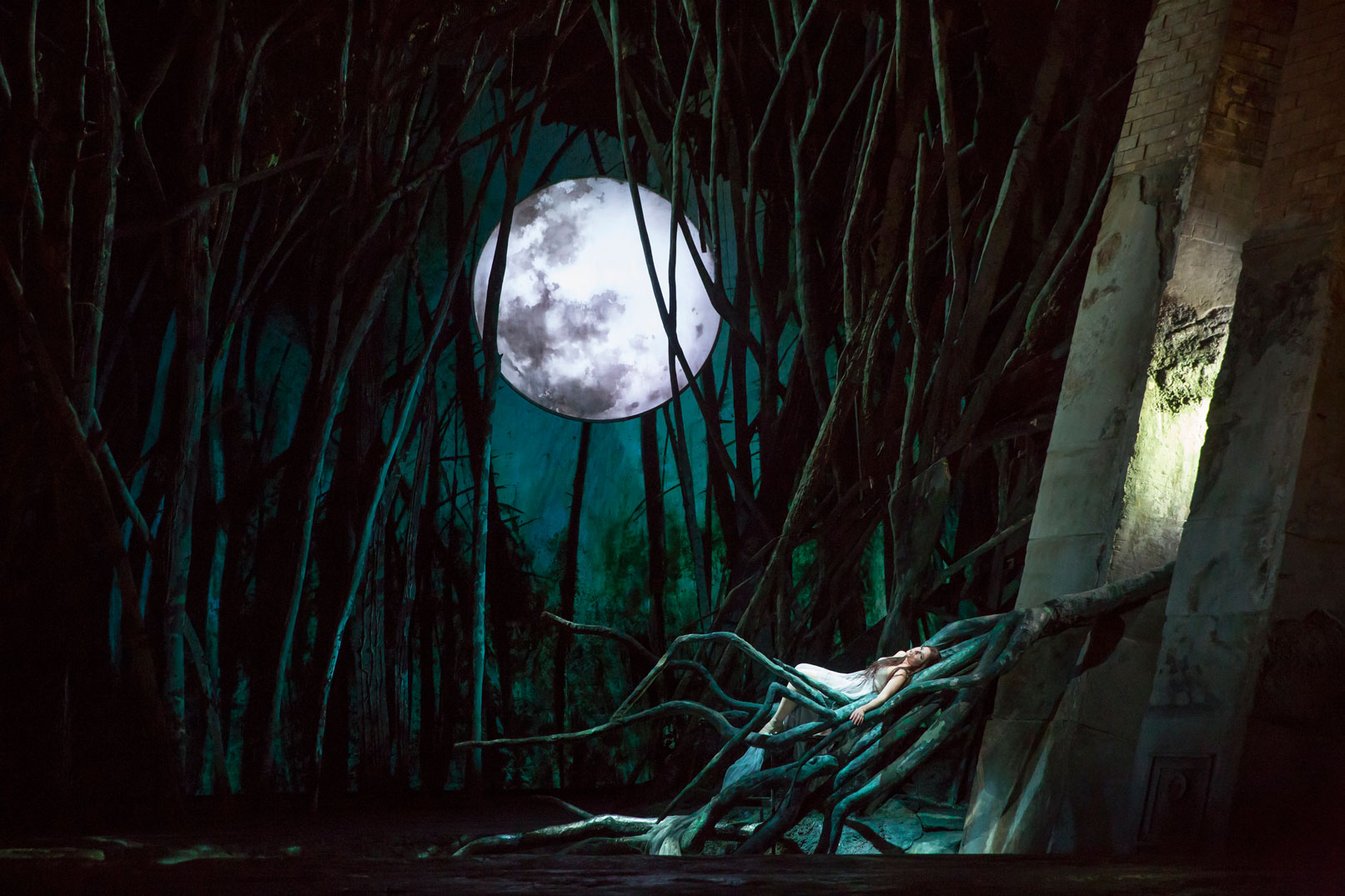 Ana María Martínez as Rusalka in Lyric Opera of Chicago’s production of Rusalka, 2014
Ana María Martínez as Rusalka in Lyric Opera of Chicago’s production of Rusalka, 2014Moon, glowing in the heavens, tell me where my lover is, tell him that I hope he's dreaming of me.
What Makes Rusalka So Special?The Little Mermaid Meets Grand, Gorgeous Opera: Danish author Hans Christian Andersen penned a huge number of fairytales — including The Emperor’s New Clothes, The Ugly Duckling, and Thumbelina — but The Little Mermaid is his most famous tale thanks to Disney’s adaptation. (But be warned: Rusalka follows Andersen’s original story much more closely, which means it doesn’t have that happy Disney ending!)
Dvořák’s Finest Music: At Christmastime in 1899, a colleague asked Czech composer Antonín Dvořák to read a new libretto (the written text of an opera) by the young poet Jaroslav Kvapil. Dvořák had already composed eight other operas by this point in his career, but Kvapil’s beautiful writing captivated Dvořák so much that he ended up creating what’s arguably his finest work.
Song to the Moon: Rusalka’s lush music draws us into the opera’s world of mysterious forests, enchanted lakes, and magical sprites. The most well-known and beloved musical highlight comes in Act I, when Rusalka confesses that she has fallen in love with a human prince in her famous “Song to the Moon.” In a melancholic turn, shortly after this heartfelt song, Rusalka gives up her voice in exchange for a human form.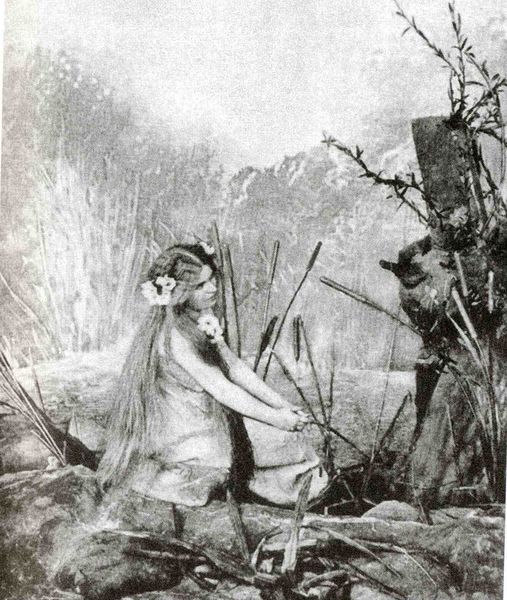 Růžena Maturová as the first Rusalka, 1901
Růžena Maturová as the first Rusalka, 1901The Story
To pursue her beloved prince charming, the mermaid Rusalka trades her voice for human form. But if he doesn’t stay true to her sacrifice, there will be fatal consequences. Can love overcome a curse?A Watery Myth
A mermaid longs for love and enters a dubious bargain with a sea witch, not realizing the ultimate cost. This classic myth exists in numerous versions, with many regional adaptations, including Hans Christian Andersen’s The Little Mermaid and Friederich de la Motte Fouqué’s Undine.
In Slavic folklore, the rusalka is a seductive female water spirit that haunts the waterways, luring men to their watery graves. Despite becoming associated with malevolent forces and representing femininity as a threat, the rusalka myth’s earliest pagan origins are more benign, symbolizing fertility rather than death.
The libretto combines these various threads into a heartfelt text that the poet Jaroslav Kvapil began composing while spending his summer on the Danish island of Bornholm. Kvapil spent his holidays reading not only Andersen’s stories but also the fairytales of Czech writers Karel Jaromír Erben and Božena Nemcová. These evocative stories “accompanied [him] to the seashore… and there impressions from Andersen, the love of my childhood days, and the rhythm of Erben’s ballads, those most beautiful of Czech ballads, merged into one. This complex inspiration gave rise to a new fairytale about the love of the water nymph Rusalka for a prince — a human being — for whom she resolves to forsake her native lake.”
The Music
Born in 1841, Antonín Dvořák is one of the most significant Czech composers, alongside important contributors to the repertoire like Bedrich Smetana and Leoš Janácek.
Dvořák first came to opera as a musician — he played violin in an orchestra that was led by Smetana and, in 1863, played a concert of German composer Richard Wagner’s music, which was conducted by Wagner himself. Dvořák became fascinated with opera and thought that of all musical forms, it was “the most suitable form for the [Czech] nation” to develop as a storytelling medium. His works drew inspiration from traditional folk music and combined those with opulent orchestration.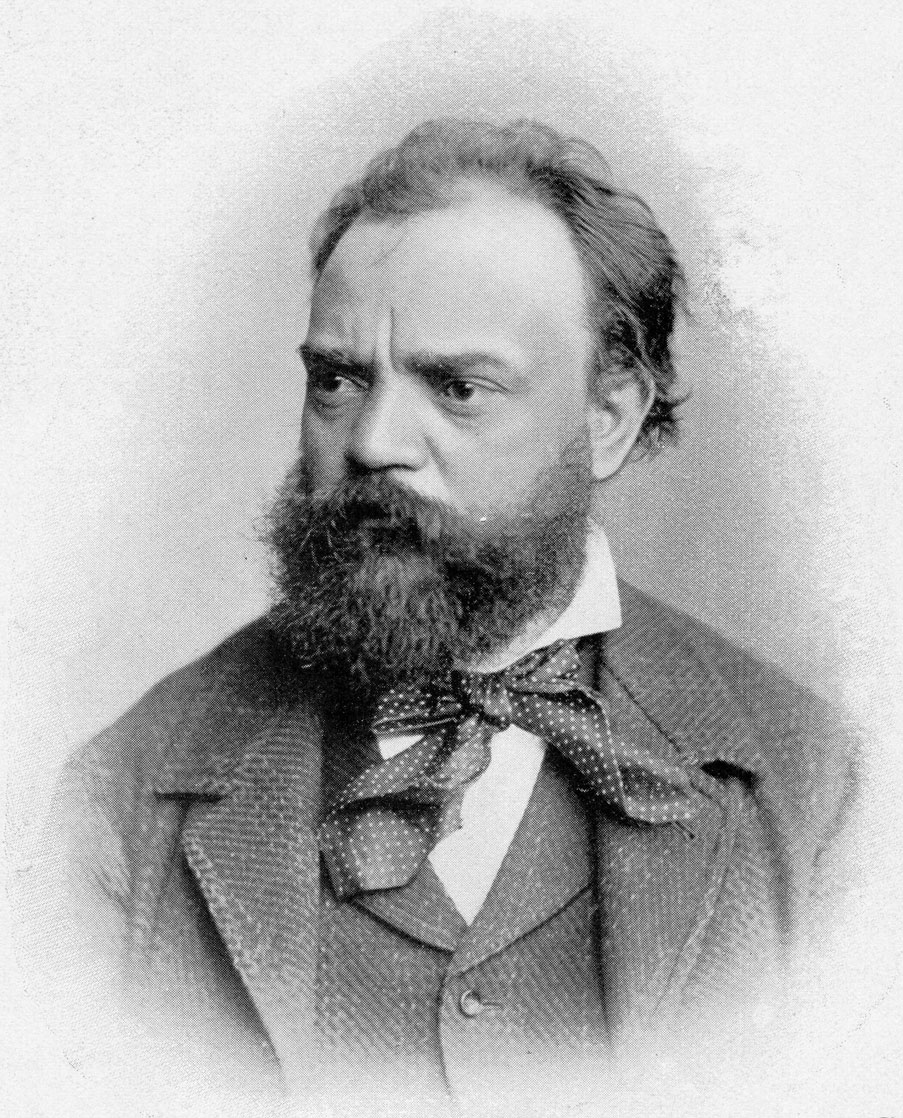 Antonín Dvořák
Antonín DvořákDvořák completed the full score of Rusalka in just seven months. Like the librettist Kvapil, he found himself creating in an inspired state, surrounded by a fairytale setting at his summer residence in Vysoká that transported him: “I am filled with enthusiasm and joy that my work is going so well,” he said at the time.
Rusalka is often considered Dvořák’s most expressive work, filled with lyrical and impressionistic melodies like “Song to the Moon.” Dvořák’s admiration of Wagner was also on display in the distinctive leitmotifs (recurring musical themes) that accompany various characters as they appear in the story. Wagner, according to Dvořák, “was so great a genius that he was capable of doing things that were beyond the reach of other composers.”
In 1901, the opera premiered at the National Theatre in Prague to great acclaim, making an immediate connection with audiences and, to this day, remaining one of the most performed Czech operas of all time.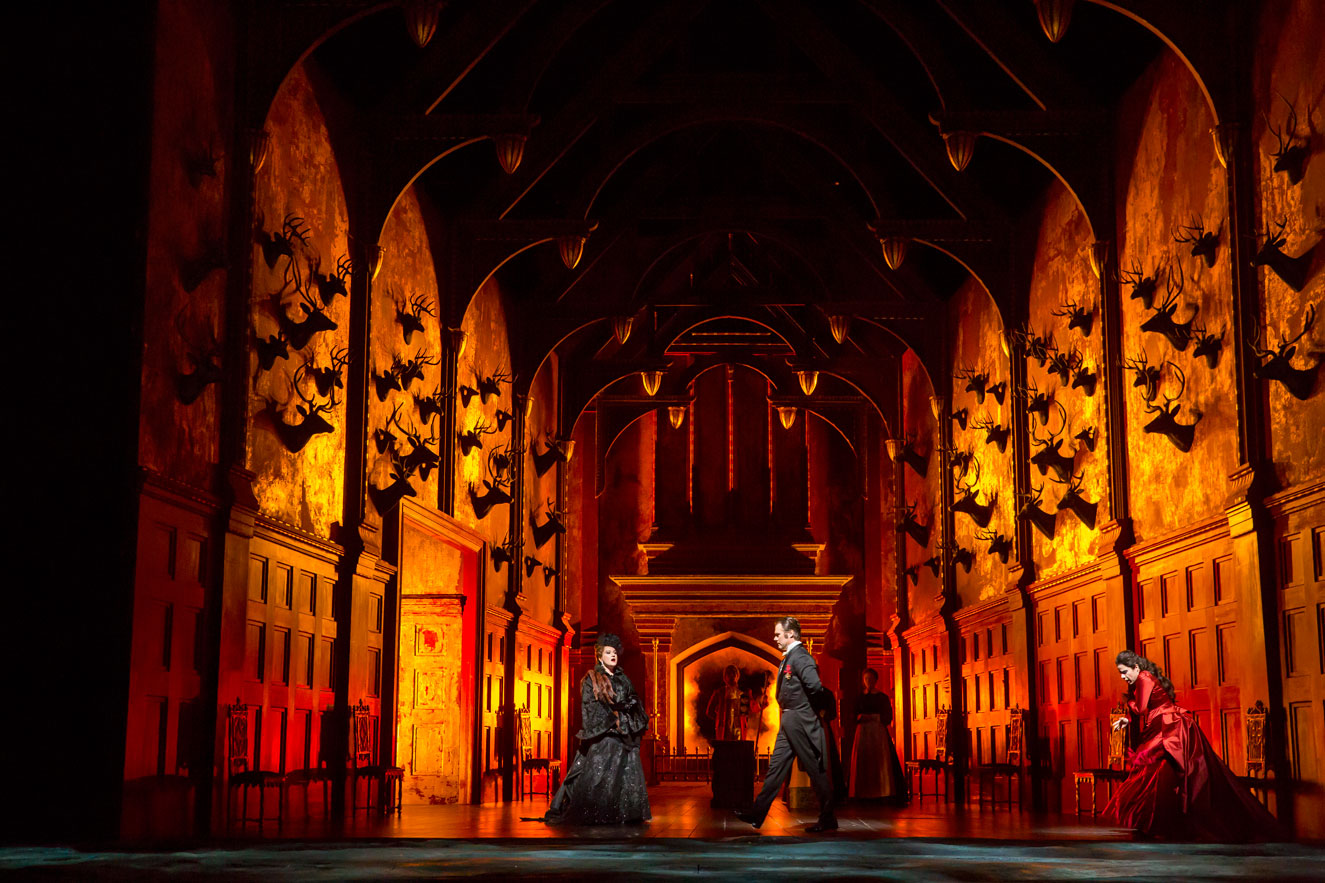 A scene from Lyric Opera of Chicago’s production of Rusalka, 2014
A scene from Lyric Opera of Chicago’s production of Rusalka, 2014The Look
This stunning and “psychologically astute” (Opera News) production is from acclaimed Scottish director Sir David McVicar, making his COC debut. The shimmering sky and enchanted watery realm evoked in Dvořák’s score have been brought to life by designer John Macfarlane with a rich palette of jewel-tone blues and greens under a luminescent moon. By contrast, scenes on land are set among the harsh, red glow of a Gothic great hall. Classical ballet sequences, choreographed by Andrew George, reinforce the Rusalka’s inability to dance herself and strike home the ultimate price of her bargain.
According to the Chicago Tribune, McVicar “infused his production with the supernatural mysteries and dark humor of Czech folklore, bringing us a world in which pristine nature is progressively despoiled by humankind. This environmental decay runs parallel to the despoiling of the souls of the accursed Rusalka and her lover.”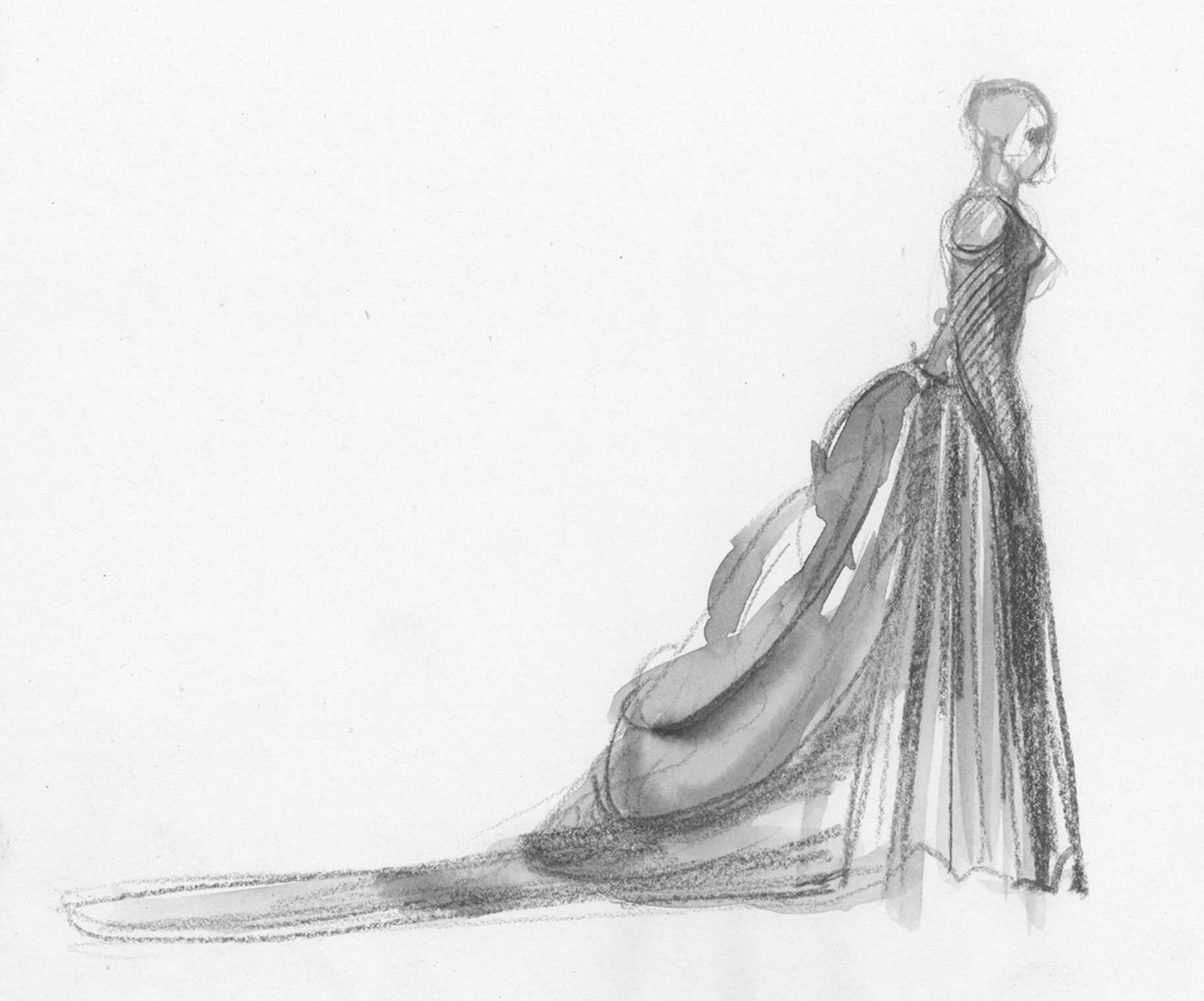 An early costume sketch by costume designer Moritz Junge
An early costume sketch by costume designer Moritz Junge
Join us for Dvořák's Rusalka, on stage from October 12 to October 26, 2019 at the Four Seasons Centre for the Performing Arts.
Photo credits: Lyric Opera of Chicago production photos by Todd Rosenberg.
